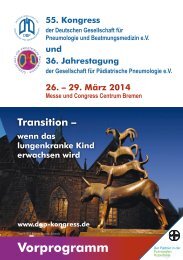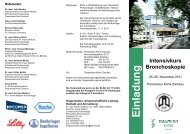Gesellschaft für Pädiatrische Pneumologie
zum pdf.... - GPP
zum pdf.... - GPP
Create successful ePaper yourself
Turn your PDF publications into a flip-book with our unique Google optimized e-Paper software.
Weiterbildung<br />
Aus den AGs<br />
den muss. Daneben sind Beispiele<br />
gegeben, wie die Dokumentation<br />
der Weiterbildung erfolgen<br />
kann (Portfolio, Falldiskussion<br />
etc.). Mit diesen praktischen<br />
Empfehlungen geht das<br />
europäische Curriculum über<br />
das hinaus, was derzeit in der<br />
deutschen Weiterbildungsordnung<br />
hinterlegt ist.<br />
Auch wenn die europäischen<br />
Weiterbildungsinhalte formell<br />
<strong>für</strong> die Weiterbildung in<br />
Deutschland nicht verpflichtend<br />
sind, lohnt es sich <strong>für</strong> alle Weiterbilder<br />
und Weiterzubildenden,<br />
einen Blick in diese ausführlichen<br />
europäischen Empfehlungen<br />
zu werfen.<br />
Europäische Prüfung<br />
Im Rahmen der ERS-Jahrestagung<br />
2011 in Amsterdam wird<br />
die erste europäische Prüfung<br />
in Paediatric Respiratory Medicine<br />
stattfinden. Analog zu<br />
den von den Erwachsenen bereits<br />
seit mehreren Jahren angebotenen<br />
Examen wird derzeit<br />
ein Multiple-Choice-Examen<br />
vorbereitet, das <strong>für</strong> auf<br />
natio naler Ebene bereits qualifizierte<br />
Pneumologen den Erwerb<br />
eines European Diploma<br />
ermöglicht. Alle pädiatrischen<br />
Pneumologen in der GPP sind<br />
herzlich eingeladen, an dieser<br />
MCQ-Prüfung teilzunehmen!<br />
Prof. Dr. med. Monika Gappa,<br />
Marien-Hospital Wesel,<br />
Klinik <strong>für</strong> Kinder- und<br />
Jugendmedizin<br />
Pastor-Janßen-Str. 8–38<br />
46483 Wesel<br />
E-Mail: monika.gappa@<br />
marien-hospital-wesel.de,<br />
monika.gappa@prohomine.de<br />
Literaturliste:<br />
[1] Gappa M, Noel JL, Severin T et al.:<br />
Paediatrc HERMES: European Curriculum<br />
Recommendations for Training in Paediatric<br />
Respiratory Medicine. Breathe 2010:<br />
7: 72–79.<br />
[2] Gappa M, Paton J, Baraldi E, Bush<br />
A, Carlsen KH, de Jongste JC, Eber E,<br />
Fauroux B, McKenzie S, Noël JL, Palange<br />
P, Pohunek P, Priftis K, Séverin T, Wildhaber<br />
JH, Zivkovic Z, Zach M: Paediatric<br />
HERMES: update of the European Training<br />
Syllabus for Paediatric Respiratory Medicine.<br />
Eur Respir J 2009 Mar; 33 (3): 464–5.<br />
[3] Gappa M; Paediatric HERMES ERS<br />
Task Force: Paediatric respiratory medicine<br />
the European perspective. Paediatr Respir<br />
Rev 2010 Mar; 11 (1): 64–5<br />
[4] Gappa M, Ferkol T, Kovesi T, Landau L,<br />
McColley S, Sanchez I, Tal A, Wong GW,<br />
Zar H: Pediatric respiratory medicine – an<br />
international perspective. Pediatr Pulmonol<br />
2010 Jan; 45 (1): 14–24. Review. PubMed<br />
PMID: 20014351.<br />
[5] Gappa M, Noël JL, Séverin T, Paton JY;<br />
Paediatric HERMES Task Force: European<br />
Curriculum Recommendations for Training<br />
in Paediatric Respiratory Medicine: one<br />
step further. Eur Respir J 2010 Sep; 36<br />
(3): 478–9.<br />
Syllabus items Knowledge Skills<br />
Attitudes and<br />
behaviour<br />
Level of<br />
competence<br />
Minimum<br />
clinical exposure<br />
Assessment<br />
tools *<br />
Sample clinical<br />
situation<br />
5) Diagnosis and<br />
management of<br />
extrapulmonary<br />
manifestations<br />
of CF<br />
• Range of presentations<br />
of CF<br />
• Presentation of extrapulmonary<br />
manifestations of CF<br />
• Interactions between pulmonary<br />
and nonpulmonary<br />
disease manifestations<br />
• Identification of extrapulmonary<br />
disease<br />
• Ability to judge when to<br />
investigate for subclinical<br />
disease<br />
• Willingness to adopt<br />
holistic approach to clinical<br />
care<br />
3 • Supervision of inpatient<br />
and outpatient management<br />
for at least 1 yr in a<br />
CF centre<br />
• Participation in > 10<br />
MDT discussions<br />
• Portfolio<br />
• Feedback<br />
on letters<br />
• Management of<br />
extrapulmonary<br />
complication of CF,<br />
e.g. diagnosing and<br />
managing CF related<br />
diabetes<br />
6) Evidence-based<br />
management<br />
7) Crossinfection<br />
and hygiene<br />
• Up-to-date knowledge of<br />
published guidelines and<br />
evidence on the management<br />
of CF<br />
• Crossinfection in respiratory<br />
aspects of CF<br />
• Interpretation and application<br />
of guidelines<br />
• Development and implementation<br />
of local infection<br />
control guide lines<br />
• Willingness to formulate<br />
an individualised treatment<br />
plan integrating<br />
evidence-based treatment<br />
and family input<br />
• Willingness to understand<br />
the barriers<br />
to ensuring effective<br />
implementation of crossinfection<br />
prevent ion<br />
policies<br />
3 • Audit of guideline<br />
implementation (at least<br />
one during the time in the<br />
CF unit)<br />
• Portfolio<br />
• Feedback<br />
on letters<br />
• Audit<br />
3 • Audit of hygiene • Audit<br />
• Review of local<br />
pratice<br />
8) Understanding<br />
of microbiology<br />
relevant to CF<br />
• Relevant respiratory pathogens<br />
• Effective respiratory<br />
specimen collection from<br />
children of all ages<br />
3 • Microbiological case<br />
review<br />
• Minimum of five<br />
successful sample<br />
collect ions<br />
• Portfolio<br />
• Managing the first<br />
isolate of pseudomonas<br />
in a child<br />
with CF<br />
9) Knowledge of<br />
emerging treatment<br />
strategies<br />
10) Management<br />
of end-stage<br />
lung disease and<br />
indications for lung<br />
transplantation<br />
• Up-to-date knowledge<br />
of novel and experimental<br />
treatment of CF<br />
• Principles of terminal care<br />
for CF patients<br />
• Indications for referral for<br />
transplant, complications<br />
and outcomes of transplant<br />
• Ability to judge how<br />
and when to adopt novel<br />
treatments into local<br />
practice<br />
• Counselling for transplant<br />
• Management of endstage<br />
respiratory failure<br />
in a CF patient<br />
• Willingness to respond<br />
in an informed and<br />
empathic manner to families'<br />
requests for novel<br />
treatments<br />
• Willingness to understand<br />
the need for<br />
obtaining consent when<br />
initiating novel treatments<br />
• Willingness to demonstrate<br />
effective support for<br />
families and caregivers of<br />
dying patients<br />
• Willingness to acknowledge<br />
the wishes of<br />
patient and family<br />
3 • Discussion of local<br />
applicability and costeffectiveness<br />
of novel<br />
treatments<br />
• Portfolio<br />
3 • Observing and participating<br />
in care of dying<br />
child, learning from experienced<br />
team members<br />
• Portfolio<br />
• Feedback<br />
on letters<br />
• CbD<br />
• Managing a child<br />
with advanced CF<br />
* all items can be assessed using MCQ in a written knowledge-based examination; refer to assessment toolbox for suggested methods<br />
49





